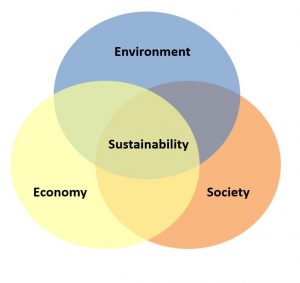The word “sustainability” is heard everywhere today. The term regularly comes up in political discussions, in product descriptions, in advertising and daily conversations. It is striking that the term is often used in very different ways. Especially for renewable energy systems, such as solar systems, the expectations on sustainability are very high and are often synonymous with a sustainable energy supply.
At Fraunhofer ISE, we evaluate and investigate the sustainability of all technologies that we are working on, with the aim of making the energy transition as sustainable as possible. Some examples from our current research are the development of water treatment plants, assessing the recycling potential of photovoltaic production plants, or developing and optimizing heat pumps with environmentally friendly refrigerants.
In this post, I would like to give a general overview of what the term “sustainability” really means and the concept behind it. This post is the first in a series of posts in which Fraunhofer ISE’s sustainability experts will dive into more detail on the individual aspects of sustainability and circularity.
What does sustainability mean?
Sustainability generally means using or operating something in such a way that it is stable over the long term and can thus be used permanently. That is, sustainable development is development that meets the needs of the present without compromising the ability of future generations to meet their own needs. A good example is to take only as much wood from a forest as will grow back. In this example, the assessment is simple. It becomes more complex for more sophisticated technical facilities or systems (e.g. economies or ecosystems), as an increasing variety of sub-aspects have to be taken into account.
What does sustainability include?

The term sustainability is often associated with and limited to ecology. Thus, sustainable products are understood to be ecological or natural products. On the one hand, this aspect includes the use of resources, such as materials and energy, which must be as sustainable as possible. This means that one should use as few resources as absolutely necessary, and either as long as possible or repeatedly by means of recycling. On the other hand, the environmental impact of, for example, exhaust gases, etc. must also be kept to a minimum, causing as little change to the environment as possible. Carbon dioxide emissions are one of most well-known parameters used to assess the climate-changing effect of a product or process.
However, the sustainable operation and use of systems or plants in the long-term requires that they are also economically sustainable in the long-term. This means both financially stable and economically attractive.
The social and ethical aspects are also crucial factors in our path towards sustainability. Sustainable products or systems are not compatible with the exploitation or oppression of people. What is considered as part of the system under investigation can be very different. The system can refer to the use of individual devices, which are used, maintained and cared for in such a way that they function as long as possible, or it may also include the entire economic system or the relevant ecosystems.
How does one evaluate sustainability?
A comprehensive database is required to evaluate all of the above-mentioned sub-aspects of sustainability. Unfortunately, this data is often not available in good and reliable quality for the specific products. Therefore, we must often estimate data or fall back on typical values. Different approaches exist for assessing the individual sub-aspects: For environmental sustainability, the so-called life cycle assessment (LCA) is often used for the evaluation, which records and calculates the use of resources and the impact on the environment.
Economic sustainability can be calculated and evaluated using established approaches from business administration and economics (e.g., Life Cycle Costing assessment, or LCC).
The assessment of social aspects is less established so far, but there are approaches, such as those of the Social Life Cycle Assessment (S-LCA).
As a whole, sustainability describes the ecological, economic and social effects of systems or products on their environment. An evaluation of all sub-aspects of different products often yields different winners for the individual aspects, and even within the sub-aspects there are often variables that cannot be optimized simultaneously. As an example, we can think of fair-trade organic food from small farms in South America, which is certainly extremely beneficial economically and socially, but causes very large CO2 emissions due to the long transport. An older electrical appliance consumes more electricity than a new one, but no rare metals involving child-labor were used for its production. It is very difficult to make a clear decision here, and when all the partial aspects of ecology, economy and social evaluation are included, a multi-dimensional problem arises.
Decisions based on sustainability
As you can see, sustainability involves many aspects, which makes the decisions sometimes difficult. They also depend on the respective value systems and priorities.
Especially for long-term issues, such as those concerning our future energy supply, the evaluation of sustainability is extremely important. Alternative possibilities can be compiled and evaluated and compared using the corresponding evaluation procedures. In this way we are able to discuss the pros and cons and make well-founded decisions on this basis.
In order to work on these diverse topics, we collaborate with various specialist groups within the Institute and also with many institutes within Fraunhofer under the Circonomy® brand.
Add comment